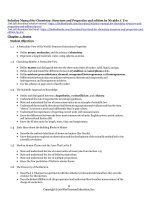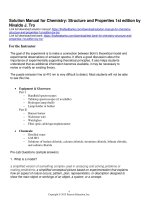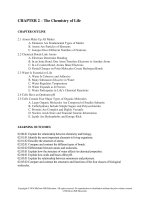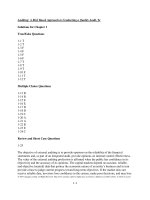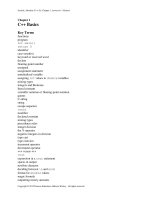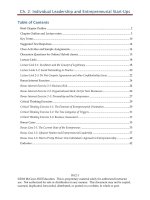Test bank and solution manual of chemistry structure and properties (2)
Bạn đang xem bản rút gọn của tài liệu. Xem và tải ngay bản đầy đủ của tài liệu tại đây (496.48 KB, 3 trang )
Experiment 2
Atomic Emission Spectra—Comparing Experimental Results to
Bohr’s Theoretical Model
For the Instructor
The goal of the experiment is to make a connection between Bohr’s theoretical model and
experimental observations of emission spectra. It offers a good discussion about the
importance of experimentally supporting theoretical principles. It also helps students
understand that as additional information becomes available, it may be necessary to
revise or modify an existing theory.
The purple emission line at 410 nm is very difficult to detect. Most students will not be able
to see this line.
•
Equipment & Glassware:
Part I
- Handheld spectroscopes
- Tabletop spectroscopes (if available)
- Hydrogen lamp (bulb)
- Lamp holder or ballast
Part II
- Bunsen burner
- Nichrome wire
- Watchglass
- Fiber optic cable/spectrophotometer
•
Chemicals:
- Distilled water
- 6 M HCl
- Solutions of barium chloride, calcium chloride, strontium chloride, lithium chloride,
and sodium chloride
Pre-Lab Questions (sample answers)
1. What is a model?
a simplified version of something complex used in analyzing and solving problems or
making predictions; a simplified conceptual picture based on experimentation that explains
how an aspect of nature occurs; pattern, plan, representation, or description designed to
show the main object or workings of an object, a system, or a concept.
4
Copyright © 2015 Pearson Education, Inc.
Experiment 2: Atomic Emission Spectra—Comparing Experimental Results to Bohr’s Theoretical Model
2. Explain Rutherford’s nuclear model of an atom.
An atom consists of a central positive charge surrounded by a cloud of electrons where
the mass lies in the center. An atom is mostly space occupied by electrons. The center of
the atom consists of a nucleus that contains a positive charge and basically all of the
mass of the atom.
3. What is a continuous spectrum?
•
A continuous spectrum consists of energy of all wavelengths. The spectrum formed
from white light contains all colors, or frequencies, and is known as a continuous
spectrum. A spectrum that contains all wavelengths present between certain limits;
it is produced by electrons undergoing free-bound transitions in a hot gas
4. What is an emission spectrum?
An emission spectrum is a line spectrum corresponding to the energy differences between
electron orbits. When the electrons in an element are excited, they move to higher energy
orbits. As the electrons fall back down and leave the excited state, energy is emitted, the
wavelength of which refers to the discrete lines of the emission spectrum.
5. Neils Bohr derived an equation for calculating energy levels of an atom:
[EQ] E = –2.18 × 10–18 J(Z2/n2)
Why does the equation have a negative sign, resulting in a negative energy value?
Bohr defines the zero point of the atom’s energy when the electron is completely removed
from the nucleus. Therefore, the energy is negative when the electron is associated with
or orbiting the nucleus.
6. It will be necessary to calibrate the spectroscope in this experiment. What does it mean
to calibrate something? Explain calibration and give an example of something in a
household or office that may need to be calibrated from time to time. Explain why the
object or device needs calibration.
Calibration is the process of correcting a measuring device for systematic error by
comparing it to a known standard. Household items that require calibration include:
thermostat for temperature readings in a furnace, hot water heater, refrigerator or oven;
5
Copyright © 2015 Pearson Education, Inc.
Experiment 2: Atomic Emission Spectra—Comparing Experimental Results to Bohr’s Theoretical Model
mass reading of a bathroom or kitchen scale; frequency settings of television or radio
channels for correlation to a remote controlkitchen measuring tools for volume such as a
cup, teaspoon, etc.
6
Copyright © 2015 Pearson Education, Inc.
